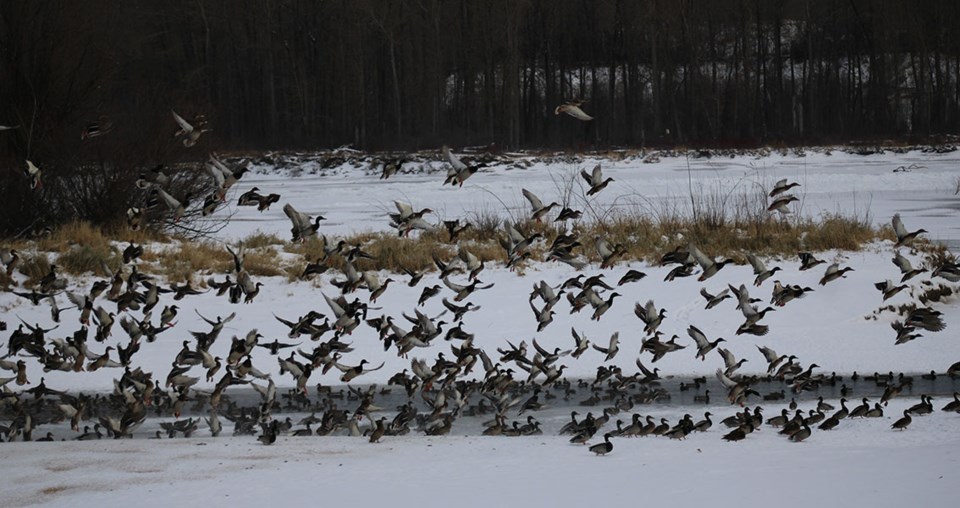A group of UNBC environmental studies students appeared before city council on Monday to ask the City of Prince George to crack down on people feeding ducks and other animals at Cottonwood Island Park.
As part of a broader presentation about the importance of public greenspace, the students called on the city to enforce measures in city Bylaw 8425, 2012 which prohibits people from placing wildlife attractants like food in places where it could attract dangerous wildlife (including bears, cougars, coyotes and wolves) or members of the deer family. The city does not impose fines or penalties for violations of those sections of the bylaw.
“….(Having) birdseed, bread, cat food scattered around one of our most popular parks is quite a deterrent for people,” UNBC student Drew Gilchrist said. “It also causes other issues, such as garbage bears. It is a dangerous animal attractant and it can adversely effect the ecosystem as well.”
Members of Ducks Unlimited Canada have been feeding ducks at Cottonwood Island Park during the winter over the past several years. In addition, many park users bring birdseed or other food to feed chickadees and other birds in the park during the warmer months.
Gilchrist said there are now hundreds of ducks spending the entire winter in Prince George, instead of migrating south.
‘THERE COULD BE MASS DIE-OFF EVENT’
“So having generational impacts on that population is also significant,” she said. “We worry at a certain point if the ducks are no longer fed, there could be a mass die-off event. As well, the unnatural congregation of ducks makes it a lot easier for disease to be spread. And high-pathogen avian flu has been a major concern in Canada and in B.C. for the past couple years.”
High-pathogen avian flu has been documented in northern B.C., and could also result in a mass die-off of ducks at the park “and I can’t think of anything worse for the aesthetics of a park than dead animals,” Gilchrist added.
The city should send bylaw officers to the park to enforce the bylaw, and to post signage informing residents why it is harmful to feed wildlife, the students said. In addition, the city should work with an environmental consultant to develop a plan for the park’s duck population.
“If you just stop feeding them, it could have a drastic effect – not just on the duck population, but the ecosystem as a whole,” Gilchrist said.
‘I WAS VERY OVERWHELMED BY THE NUMBER OF DUCKS’
In response to a question by Coun. Brian Skakun regarding enforcing the city’s bylaws in the park, city director of public safety Adam Davey said bylaw enforcement in the city is complaint-driven, and the city’s bylaw enforcement team receive an average of 70 to 80 calls for service per day.
“I do know that ducks in the winter on ice, they’re vulnerable to disease, but also coyotes, fox, lynx all that,” Skakun said. “When they’re on the water, they’re relatively safe.”
Skakun said he appreciated the group of students coming before council to express their concerns.
Coun. Cori Ramsay requested that the city’s communications department prepare information for the public, regarding the concerns around feeding wildlife. Ramsay also said there may be some cross jurisdictional concerns involving the provincial Fish and Wildlife Branch and Fisheries and Oceans Canada because it impacts fish-bearing waterways.
“Knowing that we do have a complaint-driven bylaw system, perhaps just some educational pieces for the public consumption might be really beneficial,” Ramsay said. “I don’t know if I can just flag that for follow up. Because coincidentally I did get sent a picture… last week and there was probably a thousand-plus ducks down there in Cottonwood. I was very overwhelmed by the number of ducks.”
The UNBC students’ report was forwarded to city staff for follow up.



